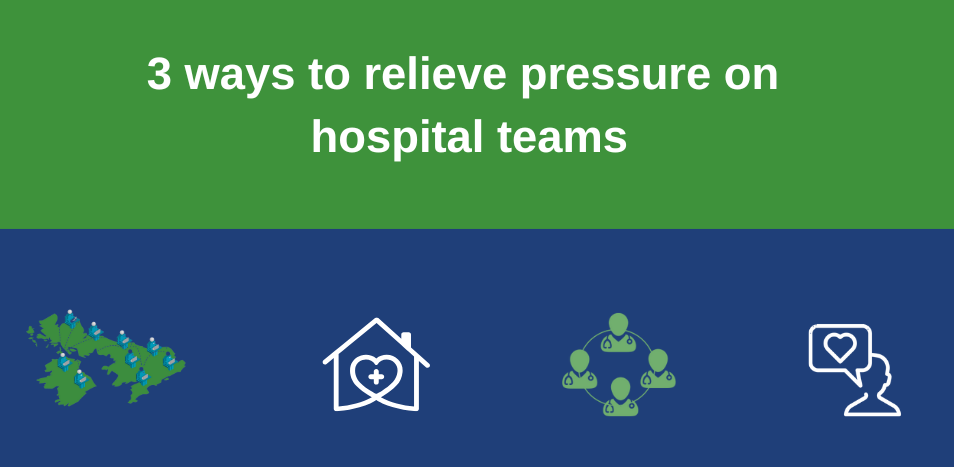3 ways virtual clinical capacities can relieve pressures on hospital teams
In this article, we share examples of how virtual clinical capacities are supporting NHS areas across the UK to relieve pressures on local teams and improve patient care.
1. Clearing waiting list backlogs
Our clinically-led Referral Triage and Validation service, delivered by consultants on the National Consultant Network (NCN), provides virtual management plans for long waiters or new referrals and has proven to reduce waiting lists by 33% on average, even more in some specialties. The service supports Trusts with clinical staffing challenges by bringing in temporary NHS consultant capacity in the form of ‘virtual locums’, they work remotely and follow local pathways and protocols under the leadership of the Trust’s clinical lead.
Examples:
- Example 1: >3,800 neurology referrals triaged to date, resulting in 51% of patients removed from the waiting list and either returned to primary care with a comprehensive management plan or redirected to a more appropriate service.
- Example 2: >6,000 ENT cases triaged from over 7 NHS Trusts, allowing 30% of referrals to be safely removed from the waiting list. The remaining 70% were directed to the right place, the first time.
- Example 3: 4,000 dermatology long-waiter referrals were triaged, with 49% of patients treated outside of hospital, and 52% receiving an urgent or routine appointment.
- Example 4: >12,000 cardiology referrals triaged to date across 5 NHS Trusts. Where applicable, referrals were sent straight to test, with the results reviewed again by the consultant before deciding if an appointment was needed or if the referrals could be returned to primary care with management plans. 40% of patients were safely returned to the referrer with detailed advice and guidance.
2. Out-of-area NHS consultants delivering Advice & Guidance
A lot of our Advice & Guidance (A&G) projects now use our remote NHS consultants on the NCN to support their local teams as a back-up or cover locally-unavailable specialties. Why? Because it’s so flexible. The service can be rapidly switched on/switched off to provide short or long-term relief.
Examples:
- Area 1: did not have sufficient local consultant cover to be able to offer a full A&G service. Instead, Primary Care clinicians have rapid access to NCN consultants in 16 specialties, freeing up local capacity.
- Area 2: could not offer a local paediatric dermatology service. They introduced a paediatric teledermatology service using out-of-area NHS consultants via Consultant Connect.
- Area 3: did not have the local capacity to support adult mental health and mental health medication advice lines, so they introduced two mental health advice lines via out-of-area NHS mental health consultants.
- Area 4: uses out-of-area NHS neurology consultants as a backup to local consultants. Currently, 80% of calls are picked up by the NCN, and 20% go to local consultants.
3. ‘Overnight’ GP advice for virtual wards
If virtual ward patients’ conditions change, they would normally be brought back to hospital, even if, in many cases, they should have been able to remain at home.
The Telegraph reported that despite the aim of virtual wards being to relieve pressures on A&E departments, they could end up creating extra NHS demand as some are only staffed for 12 hours a day.
Nurses that are ‘remote carers’ for virtual ward patients at night and/or patients who are on a virtual ward themselves can now have access to immediate telephone advice from ‘overnight’ GPs via Consultant Connect. Calls via this service are answered within seconds, and the advice provided by the ‘overnight’ GP often results in the patient not needing to come back to hospital.
An NHS area recently introduced telephone access to ‘overnight’ GPs via Consultant Connect for one of their virtual wards. Night nurses can call via the service for advice, with 79% of these calls to date resulting in the patient remaining on the virtual ward and not needing to come back to hospital.
For more information, get in touch:
If you have any questions or would like to find out how virtual clinical capacities can help your area, email hello@consultantconnect.org.uk, call us on 01865 261 467 or fill in the short form below to request a call back from the team:
Related materials:
- 5 minutes with… NHS consultants on the National Consultant Network
- Top tips for a successful Referral Triage and Validation project
- The benefits of Referral Triage
- Referral Triage and Validation: reducing the ever-increasing elective care waiting list
- Rethinking referrals and delivering effective services in the community
- Enhanced Advice & Guidance: Performance Benchmarks
